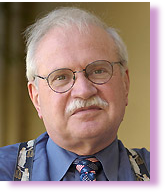

.org

Los Angeles Times
Tuesday, September 14, 1999, Front Page
Medical Need a Factor in Pot Cases, Court Says
Health: Federal appeals panel rules that marijuana centers may distribute drug if patient faces serious harm.
By MAURA DOLAN and MARY CURTIUS, Times Staff Writers
SAN FRANCISCO--A federal appeals court created a potentially major opening
in federal drug laws Monday, ruling that medical marijuana centers may be
allowed to distribute cannabis if they can prove that the drug is needed to
protect patients against imminent medical harm.
In its decision, the three-judge panel of the 9th U.S. Circuit Court of
Appeals said that a federal judge should have considered patients' medical
needs for marijuana when he ordered a cannabis club in Oakland last year to
stop distributing the drug.

The ruling "means that the federal law is not an absolute barrier to
distribution of marijuana," said Santa Clara University law professor
Gerald F. Uelmen, (pictured) who helped represent the Oakland center. "It requires courts to exercise discretion to look at the circumstances of individual patients and weigh that against the public interest."
The court did not overturn U.S. District Judge Charles Breyer's
injunction against the club, but said he must consider the case again,
taking into account evidence that some patients need cannabis to treat
debilitating and life-threatening conditions.
The decision could lead to the Oakland Cannabis Buyers Cooperative and
others being allowed to distribute marijuana to some severely ill patients,
said Robert Raich, another attorney for the center.
"It may provide a method under federal law in which medical patients,
some medical patients, can be provided with the medical cannabis they need .
. . legally," the Oakland attorney said.
California voters in November 1996 approved Proposition 215, which
permitted seriously ill patients to obtain and use marijuana with their
doctors' recommendations without being prosecuted under state law. Some
doctors and patients say that the drug quells nausea, eases pain and
restores appetite.
The Clinton administration, however, sued six Northern California clubs
on the grounds that a federal ban on marijuana distribution prevails over
the state initiative.
Oakland's center stopped distributing marijuana, three clubs closed and
two others are still open and being monitored by federal authorities.
The court ruling follows the collapse of an effort by legislators in
Sacramento to make Proposition 215 more workable by setting up a statewide
registry of medical marijuana users.
Faced with opposition from law enforcement and a likely veto from Gov.
Gray Davis, state Sen. John Vasconcellos (D-Santa Clara) abandoned his
efforts, at least for now, to win legislative approval of a registry. The
plan had been recommended by a special task force of law enforcement
officials and medical marijuana advocates put together by Atty. Gen. Bill
Lockyer in January.
In the federal court case, federal attorneys had no immediate comment
Monday on whether they will appeal the decision of the 9th Circuit panel.
Without an appeal, the case would return to Judge Breyer in San Francisco,
who would have to reconsider his injunction against the Oakland center after
reviewing evidence that marijuana is a necessity for some patients.
Protection From Harm
The 9th Circuit panel said the Oakland cooperative had presented
sufficient evidence that the injunction could be modified to reflect that
some patients with serious medical conditions need marijuana to treat their
illnesses or symptoms and will "suffer serious harm if they are denied
Cannabis."
The evidence showed that for these patients, there was no legal
alternative to obtaining marijuana for the effective treatment of their
ailments, the court said.
It saidthe federal government failed to rebut the Oakland center's
evidence that "cannabis is the only effective treatment for a large group of
seriously ill individuals."
Judge Breyer must consider whether to "exempt from the injunction,
distribution to seriously ill individuals who need cannabis for medical
purposes," said the ruling by Judges Mary M. Schroeder, Stephen Reinhardt
and Barry G. Silverman.
Raich said the 9th Circuit decision may allow a narrower class of
patients than those singled out under Proposition 215 to buy and use
cannabis. Such patients would include those with AIDS and cancer, he said.
Mark Quinlivan, a U.S. Justice Department lawyer who is handling the
marijuana case, said he had not yet read the court's ruling and had not
determined whether to ask the 9th Circuit to reconsider its decision.
"We are going to have to read it in full before we have any comment on
it," Quinlivan said.
In Sacramento, Vasconcellos' representative to the state task force
said the lawmaker will continue to work toward a compromise between medical
marijuana advocates and law enforcement officials, and to reintroduce a
state registry bill next year.
"This was far too complicated and emotional an issue to try and jam a
so-called compromise down anybody's throat," said Rand Martin, the task
force member. In addition, he said, "we were getting signals from the
governor's office that he was, at best, skeptical about the proposal as a
whole."
Hillary McLean, a spokeswoman for the governor, said Davis' "concern
from the outset was that under federal law the use of marijuana is illegal.
The governor did not want to see the state of California acting in conflict
with federal law. He had strong concerns about the bill."
Lockyer had asked the task force to find ways to make Proposition 215
more workable. As written, the measure only gives medical marijuana users a
defense to use in court if they are arrested.
In July, the task force recommended the creation of a state registry
that would provide every patient who chose to register with an
identification card. The system was meant to protect patients from arrest
and to simplify enforcement of the law for police officers. Vasconcellos
incorporated it into SB 848, which he tabled on the final day of the
legislative session.
"I'm certainly disappointed," Vasconcellos said in a statement
announcing that he was abandoning the bill this year.
After the task force had made its recommendations, several law
enforcement officials on the committee said they needed to seek approval
from their organizations for the proposals. To Lockyer and Vasconcellos'
dismay, some law enforcement agencies told them that they would oppose the
bill unless registration was mandatory.
Over the summer, Vasconcellos tried to broker a compromise, fashioning
language that would have required physicians who recommended that a patient
use medical marijuana to register that patient with the county health
department. The health department would then have forwarded the names to the
state health department, to be entered in the registry. Law enforcement
agencies embraced that idea, but it was rejected by medical marijuana
advocates, who argued that it violated the privacy of the physician-patient
relationship.
"All this was happening in the last two weeks of the session, with a
million other things going on," Martin of the task force said.
Medical marijuana advocates and law enforcement officials who
participated in the task force expressed disappointment Monday that no
compromise was found.
"This is a missed opportunity," said Pete Herley, chief of police in
Tiburon. Herley represented the California Police Chiefs Assn. on the task
force. His association would have supported the bill had the provision for
physician reporting been included, Herley said.
"We worked very hard for the last four months to develop a set of
guidelines which are sorely needed for patients, caregivers, physicians,
prosecutors and law enforcement," Herley said. "I thought everything was
settled until the very last minute."
"I'm really sad to hear it," said Karyn Sinunu, an assistant district
attorney for Santa Clara County who participated in the task force. Sinunu
said she preferred a mandatory registration system "because it is really
clean, it is as close as we can get to issuing a prescription for medical
marijuana," but she was willing to compromise and accept a voluntary system
"because I thought most people who were legitimate medical marijuana users
would take advantage of it."
Sinunu said she could understand the reluctance of some police agencies
to accept a voluntary system that would still have left a gray area of users
who were not registered. Still, she said, she thought the task force had
gone a long way toward establishing a rapport between medical marijuana
users and advocates and the police and district attorneys who were often at
odds with them.
| His Life |
| from the NY Times |
| past news |
| Buy Books from Us |
| Been There, Done that, Got Our T Shirt! |
| Oh Goody! Here's my Hoodie! |
| A Batch from the Past |
| Quotes |
| Poetry |
| Peter and Computers |
| Personal Growth |
| Luxury of a Negative Thought Main Page |
| How to Survive the Loss of a Love |
| Peter's Photography |
| Ain't Nobody's Business |
| LIFE 102 |
| Kodak Moment Quotes |
| Peter's Poems: Through the Years |
| Cards |
| Valentines |
| Handwritten Poetry |
| Journal Entries |
| Computer Articles |
| computer books |
| Computer Book Reviews |
| Newsweek Dec. 21, 1987 |
| TIME Magazine Jan. 24, 1983 |
| People Weekly Sept. 19, 1983 |
| Luxury Quotes |
| Excerpts from LIFE 102 |
| Author's Notes |
| Peter's Letter (Life 102) |
| Peter Trial: Latest News |
| Checklist for Depression |
| Peter Mail |
| Can't Use MMJ as Defense |
| Drug Laws Kill |
| I, Too, Have a Dream (August 3, 1998) |
| Libertarians Remember Peter |
| Pocono Libertarians Memorial |
| Peter in Action |
| Peter's Poetry |
| Radio Interviews |
| visits with our friends |
| Peter vs. John-Roger |
| Your Story |
| sharing stories |
| Contact Us |
| His Life |
| from the NY Times |
| past news |
| Buy Books from Us |
| Been There, Done that, Got Our T Shirt! |
| Oh Goody! Here's my Hoodie! |
| A Batch from the Past |
| Quotes |
| Poetry |
| Peter and Computers |
| Personal Growth |
| Luxury of a Negative Thought Main Page |
| How to Survive the Loss of a Love |
| Peter's Photography |
| Ain't Nobody's Business |
| LIFE 102 |
| Kodak Moment Quotes |
| Peter's Poems: Through the Years |
| Cards |
| Valentines |
| Handwritten Poetry |
| Journal Entries |
| Computer Articles |
| computer books |
| Computer Book Reviews |
| Newsweek Dec. 21, 1987 |
| TIME Magazine Jan. 24, 1983 |
| People Weekly Sept. 19, 1983 |
| Luxury Quotes |
| Excerpts from LIFE 102 |
| Author's Notes |
| Peter's Letter (Life 102) |
| Peter Trial: Latest News |
| Checklist for Depression |
| Peter Mail |
| Can't Use MMJ as Defense |
| Drug Laws Kill |
| I, Too, Have a Dream (August 3, 1998) |
| Libertarians Remember Peter |
| Pocono Libertarians Memorial |
| Peter in Action |
| Peter's Poetry |
| Radio Interviews |
| visits with our friends |
| Peter vs. John-Roger |
| Your Story |
| sharing stories |
| Contact Us |